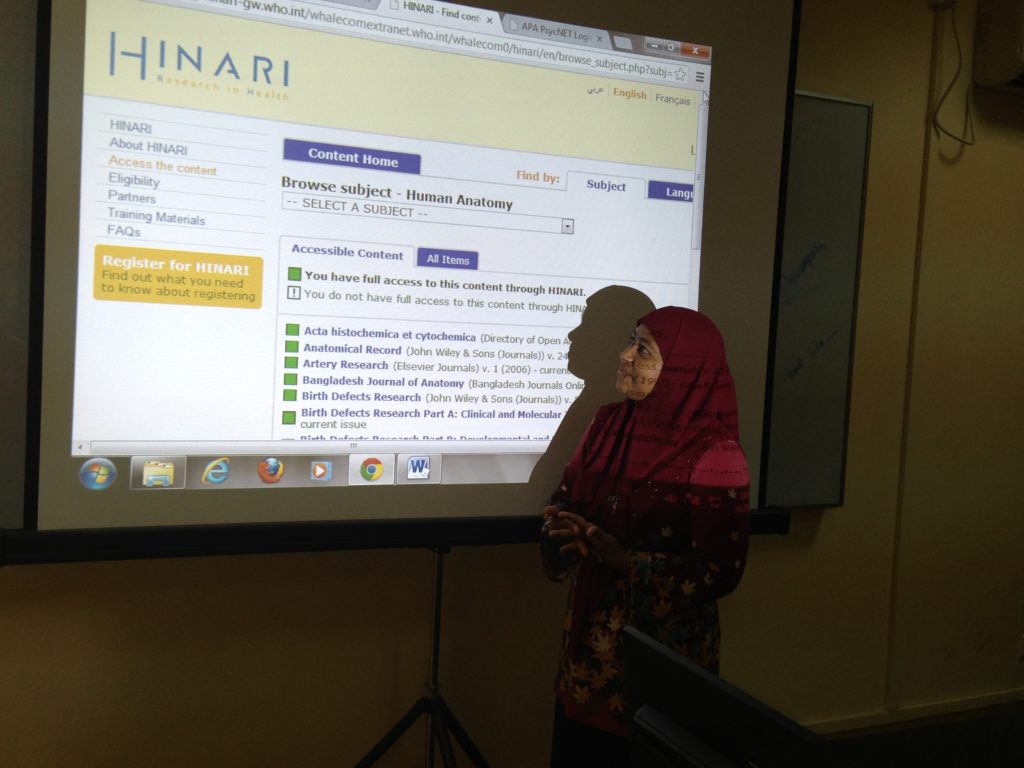Boosting a Young Democracy
Published: jeudi 28th juillet 2011
Maldives National University’s new Postgraduate Research Centre will use Research4Life to build capacity and help educate the young democracy’s future scientists and policy makers.

Shaba Shabana giving a training on HINARI at the Maldives National University.
The Maldives National University recently opened a Postgraduate Research Centre that it hopes will become recognised nationally and internationally for quality teaching, scholarship and academic research.
Research4Life is the research platform the University needs to achieve this goal, Head University Librarian Shaba Shabana explained.
I can envision research and vital discoveries that will be found, and policies and procedures that will be developed and initiated, based on medical and other scientific evidence obtained through Research4Life. The use of Research4Life has grown steadily at the capital city, Malé and four island campuses. Due to the dispersed geography of the country, use of the electronic resource has become a basic part of student and staff information literacy training. Even before visiting the library, students, researchers and health professionals from the Faculty of Health Sciences and other faculties would log in and begin an information search via HINARI or e-books, Shaba says. She expects Research4Life’s OARE and AGORA to provide the main gateway to information and research materials for the University’s new advanced programmes in environmental science, agriculture and fisheries.
“The outcomes that result from these resources cannot be counted in numbers as they will benefit the entire student and teaching community of the University, as well as the citizens of the country,” she explains.
Shaba, who studied Library Science at an Australian university, knows firsthand how access to knowledge can empower people to bring about change. She trains between 200 and 300 students and faculty each year in the use of electronic resources, while also working with library staff to enhance their skills.
Shaba became enamoured of libraries when her secondary school history teacher taught the class to retrieve the treasures their small school library contained.
“From then on, there was no stopping us; we were in the library all the time,” she explains. “The library attendant didn’t want the library shelves made untidy so she prohibited the students from entering without a teacher.” “I thought, if the shelves are messy that means people are using the library,” Shaba says, “It was not right to keep information from people.”
The Maldives did not have a university degree programme in Library Science when Shaba finished her secondary studies in the mid 1990s. She found work as a library trainee at the Institute of Health Sciences Library. It consisted of one room filled with books. Everything was done manually. Inventory as well as the borrowed materials were tracked in a logbook. There was no proper catalogue. Without any formal library training, Shaba and a colleague created a basic catalogue using Excel and established rules for borrowing library materials.
As the Republic of Maldives prepared to open its first university, Shaba obtained a government scholarship to study Library Science in Australia. During this period, all the institute libraries were centralised under a central management. After graduation, she returned to the Central Library with credentials that gave her a role in policy decisions. She convinced the heads of the various faculties to incorporate training in the use of Research4Life and other electronic resources in the first year degree programme requirements.
Research4Life training sessions also became part of the University’s annual staff development workshops. “If we can encourage people to use Research4Life in their research and to publish, we can build up this young, democratic country more,” she says, “It is my goal to be part of this change in the future.”
Her first step is to make students aware that the resources exist and are available for free. Then she explains the importance of using Research4Life to find organized, peer-reviewed sources of information rather than relying on ordinary search engines.
Shaba believes that high-quality, evidence-based, scientific literature is essential to enable researchers and students in the new Environmental Science programme to find ways to protect the island nation from threats posed by global climate change. “We are educating the students who will become future policy makers,” she announces, “Research4Life can help them make better, informed decisions.”
This story is part of “Unsung Heroes: Stories from the Library” a booklet with stories from individuals around the world who have in reality become the unsung heroes of research in their institutions.





